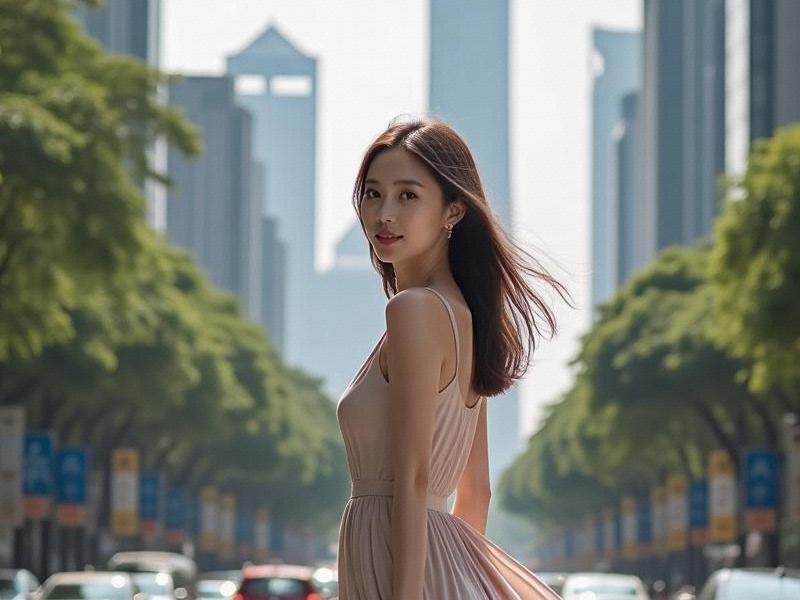The Shanghai Style: How Shanghai Women Are Redefining Modern Chinese Femininity
⏱ 2025-05-29 00:15 🔖 阿拉爱上海娱乐论坛
📢0℃

On the bustling streets of Nanjing Road, amidst the neon glow of luxury boutiques and the aromatic steam of street food stalls, walks a distinctive breed of urban women - the Shanghai "Nüzi" (女子) who embody the city's unique blend of Eastern tradition and Western modernity. These women, often called "Jingzhe" (精致) for their refined elegance, represent more than just a regional demographic; they've become cultural ambassadors of China's evolving gender identity.
Shanghai's historical role as a global port city has cultivated a particular feminine archetype that differs markedly from other Chinese regions. Unlike the delicate "Jiangnan beauty" stereotype or Beijing's straightforward "Da Sa" (大飒) style, Shanghai women navigate urban life with a distinctive combination of pragmatism and grace. "We're raised to be financially independent and aesthetically conscious simultaneously," explains Zhou Min, 32, a private equity analyst at Lujiazui's financial district who moonlights as a fashion influencer.
爱上海419论坛 This duality manifests in surprising ways. While Shanghai leads China in female entrepreneurship (38% of startups are women-led), it also maintains traditional customs like the "Niang Jia" (娘家) system where daughters maintain strong bonds with their birth families after marriage. The result is a generation of women who comfortably wear cheongsams to tea ceremonies and power suits to board meetings - often in the same week.
Fashion tells part of the story. Shanghai's women have developed a signature style that luxury brands now call the "Hai Pai" (海派) aesthetic - mixing international labels with local designers like Uma Wang and Helen Lee. The look: polished but not overdone, expensive-looking but never flashy. "Shanghai women understand that true luxury is in the details," notes Vogue China editor Margaret Zhang during Shanghai Fashion Week.
上海龙凤419贵族
The workplace reveals another dimension. While China's gender pay gap stands at 18.9% nationally, Shanghai's is just 12.3% - the narrowest in mainland China. Women fill 41% of senior management positions in the city, compared to 28% in Beijing. This professional ascendancy comes with cultural nuances; Shanghai women are renowned negotiators who practice what locals call "Mianzi Gongcheng" (面子工程) - the art of achieving one's goals while preserving others' dignity.
上海喝茶群vx Yet challenges persist. The pressure to "have it all" - successful career, perfect family, flawless appearance - has created what sociologists term "Shanghai Woman Syndrome": high rates of stress-related illness among educated urban women. New support networks like the "Steel Roses" professional collective and digital platforms such as "Lady First" are emerging to address these pressures.
As China undergoes rapid social transformation, Shanghai women stand at the vanguard - crafting an identity that honors tradition while embracing progress. Their ability to balance Confucian values with global ambitions offers a compelling model for modern femininity worldwide. In the words of celebrated writer Wang Anyi: "To understand Shanghai is to understand its women - they are the city's most accurate mirror."
Shanghai and Its Surroundings: A Blend of Tradition and ModernityThe Velvet Rope Revolution: How Shanghai's Clubs Redefined Luxury EntertainmentSilk and Startups: How Shanghai Women Are Writing a New Chapter of Oriental Femininity双面绣:上海的城市褶皱与时空密码(1843-2025)The Latest Developments and Highlights in Shanghai"Beyond Qipao & Cosplay: The New Archetypes of Shanghai Femininity in the Digital Age"Shanghai After Dark: The Reinvention of Luxury Entertainment in China's Global CityShanghai's Premium Entertainment Venues: Redefining Urban Nightlife Culture"格式
- 包含标题、关键词、描述、正文四部分
- 输出为txt格式
3. 专业要求:
- 保持新闻写作专业性
- 符合资深记者视角
- 展现文化深度
- 突出时代变迁特征
以下是为您精心创作的上海女性文化现象深度报道:The Shanghai Sheen: How China's Most Cosmopolitan Women Are Rewriting Beauty Standards

